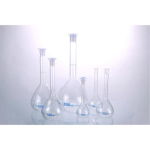Application
Proteinase K is one of the most active endopeptidases known. This PCR Grade Proteinase K is particularly suitable for isolating nucleic acids for amplification reactions, as well as:The enzyme is extremely effective on native proteins and can therefore be used to rapidly inactivate endogenous nucleases such as RNases and DNases during nucleic acid isolation. This property makes Proteinase K particularly suitable for the isolation of native RNA and DNA from tissues or cell lines.The enzyme promotes cell lysis by activating a bacterial autolytic factor.Proteinase K is used for the analysis of membrane structures by modifying proteins and glycoproteins on cell surfaces.Because the enzyme is tested for the absence of RNases and DNases, and is virtually free of DNA, it is especially suitable for isolating PCR and RT-PCR templates.Proteinase K can also be used to remove cellular debris during the preparation of colony lifts, and to treat tissue sections to ensure efficient probe infiltration during in situ hybridization.
Features and Benefits
Proteinase K is a serine protease that has no pronounced cleavage specificity. It cleaves proteins between amino acids X and Y (X-↓-Y), when X = an aliphatic, aromatic, or hydrophobic amino acid, and Y = any amino acid. The enzyme is extremely effective on native proteins and can therefore be used to rapidly inactivate endogenous nucleases such as RNases and DNases. Choose an effective tool for template preparation. Inactivate DNases and RNases of most species. Count on consistent quality and performance. Stringent quality testing ensures optimal stability and high-level lot-to-lot performance. Prepare samples over a wide range of conditions. The robust enzyme is stable over a wide pH range and is ideal for diverse applications. Benefit from a contamination-free enzyme. The enzyme is tested for the absence of RNases and DNases, and is virtually free of DNA. It is especially suited for the isolation of PCR templates.Note: The enzyme can reduce protein to free amino acids if it is present in large excess for long incubation periods.ContentsLyophilizate PCR Grade Proteinase K is also available in solution.
General description
Proteinase K is a subtilisin-related serine protease. The recombinant enzyme is identical to the native protease originally isolated from the mold Tritirachium album. The specifications of the recombinant enzyme are the same as those of the native protease. The amino acid sequence (molecular weight) and the molecule structure are identical. However, the recombinant preparation is much purer than the native enzyme, as it is DNA-free that has no pronounced cleavage specificity. The enzyme is extremely effective on native proteins and can therefore be used to rapidly inactivate endogenous nucleases such as RNases and DNases. The enzyme is also available as a solution.Inhibitors: The enzyme is inactivated by Pefabloc® SC. However, it is not inactivated by metal ions, chelating agents (e.g., EDTA), sulfhydryl reagents, or trypsin and chymotrypsin inhibitors.Activators: Proteinase K activity is stimulated by the presence of denaturing agents (SDS and urea).pH Optimum







